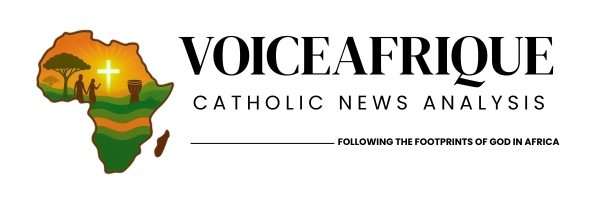Pope Leo’s recent appointment of five Africans to the Vatican’s Dicastery for Institutes of Consecrated Life and Societies of Apostolic Life brought joy and hope to many across the continent. In the Holy See Press Office bulletin of Tuesday, June 24, the Holy Father named Cristóbal Cardinal López Romero of Rabat (Morocco), Archbishop Jude Thaddaeus Ruwa’ichi of Dar-es-Salaam (Tanzania), Bishop Thulani Victor Mbuyisa of Kokstad (South Africa), Auxiliary Bishop Tesfaye Tadesse Gebresilasie of Addis Ababa (Ethiopia), and Fr. Stanley Lubungo, the Zambian-born Superior General of the Society of Missionaries of Africa.
While this is a positive step, a closer look at the broader leadership structure of the Dicastery reveals that Africans still comprise less than 5% of its total membership. For instance, only two African cardinals serve among the 21 cardinal members, one among 14 superior generals, one among 33 consultors, and two among nine bishop members. This pattern of underrepresentation is echoed across other dicasteries in the Roman Curia. It is a longstanding imbalance that many African Catholics hope Pope Leo will address.
According to Praedicate Evangelium—the Apostolic Constitution promulgated by Pope Francis on March 19, 2022—appointments to Curial offices should, as far as possible, reflect the universal character of the Church by drawing members from various regions of the world. Article 7 of this constitution also emphasizes the importance of appointing individuals with proven competence and expertise.
Pope Leo’s inclusion of five Africans in this key dicastery marks a welcome shift from previous trends. For example, in September 2024, Pope Francis appointed 28 consultors to the Dicastery for the Doctrine of the Faith—none of whom was African. This omission was seen by some as a rebuke to African churches and theologians who had resisted the controversial document Fiducia Supplicans. For a pope known for his affection toward Africa, it was surprising—and disappointing—that Africans were marginally represented during his papacy. At the time of his death, no African headed a dicastery as Prefect—something not seen in over four decades. African Catholics are no longer content with symbolic inclusion or token appointments or with eating crumbs that fall from the master’s table. The time has come to ensure Africa’s substantive participation and equal representation in the global Church.
African Catholicism has come of age. It is now essential that Pope Leo and his advisors look toward Africa not only for priests and religious but also for lay professionals and experts, women religious, theologians, communicators, business leaders, and technology experts. These individuals bring critical skills and perspectives that can help the Church address pressing global issues—particularly those affecting Africa. African concerns and priorities are better articulated by Africans themselves, not mediated by outsiders unfamiliar with the continent’s realities, dynamism, diversities of experiences in matters of faith, life, cultural differences, pastoral contextual analysis, and the daily challenges and complexities facing God’s people in Africa.
According to the Church’s Book of Statistics (2025 edition), African Catholics now constitute roughly 20% of the global Catholic population. The number of Catholics in Africa grew from 272 million in 2022 to 281 million in 2023. The Democratic Republic of Congo leads with nearly 55 million baptized Catholics, followed by Nigeria with 35 million. Uganda, Tanzania, and Kenya also report significant Catholic populations. Africa is experiencing the fastest growth in the Church—not just in numbers, but also in vocations, institutions, and dynamism. Notably, it is the only region seeing growth in minor seminaries, ensuring a future pipeline of priests and pastoral agents ready to serve the global Church.
Despite this vibrant growth, Africa remains woefully underrepresented in the Roman Curia—with less than 5% representation. This disparity raises a pressing question: why is the Church in Rome so slow to elevate African voices and perspectives in its global governance with the rich talents and competence of African Church leaders, pastoral agents and dynamic laity whose witness and leadership are driving the momentum of Christian expansion in Africa?
A senior Curial official once suggested in a conversation with me that African experts—particularly women religious and lay leaders—are not visible enough within the highest levels of church administration on the continent. As a result, when Rome seeks candidates for global roles, it often overlooks Africans. While this explanation deserves reflection, it is only part of the story. The Church has multiple channels of communication and should actively and transparently consult across regions to identify and uplift Africa’s rich talent pool.
The time to act is now. Under Pope Leo’s leadership, the Church must begin a serious conversation about redressing this imbalance. It is urgent to remove the systemic barriers that limit African visibility and ensure that future appointments reflect the true universality of the Catholic Church.


2 comments
A culture of dependency on the west for financial and pastoral aid has continued to erode the visibility and voice of the church in Africa. This has given rise to a culture of self-satisfaction with the crumbs falling from the masters’ tables. Is the church in Africa able to put its house in order? This will require courageous and visionary leadership far more than what is presently in place. When the leadership is there, so much will fall in place.
I do agree with you wholeheartedly that Africa needs to be represented in the leadership structures of the Roman Curia. While holding that in place, I am compelled to also probe further, it is not just a matter of presence. African presence ought to also be shaped by a deliberate contribution of African collective wisdom to the running of the global Catholic Church. I like the fact that you broaden the vision of the ways Africa can be represented. We need an African presence that goes beyond the level of clerical status in the Roman Curia. Thanks for these insights.